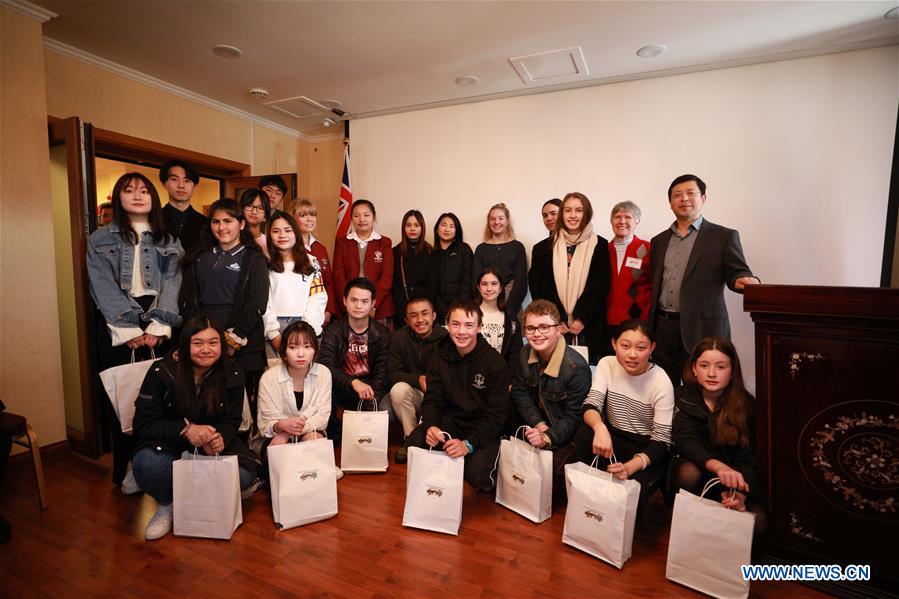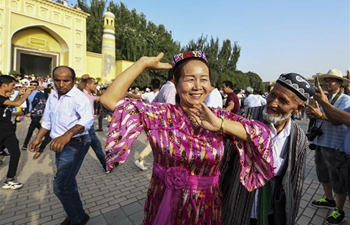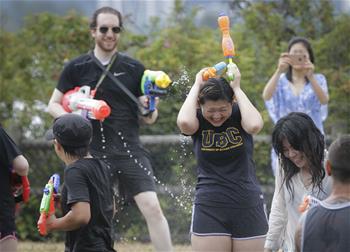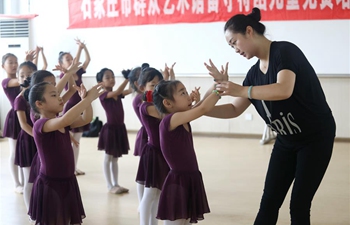
Yang Zhi (1st right, back row), minister-counselor for culture at the Chinese Embassy in Australia, and Carol Keil (2nd right, back row), president of the Australian Capital Territory (ACT) branch of the Australia China Friendship Society, pose for photos with winners of awards for Mandarin study, in Canberra, Australia, Aug. 11, 2019. The Australia China Friendship Society ACT Branch initiated the awards in 1991 in a bid to encourage local students to learn Mandarin. This year, 24 students from 12 schools received the awards for the best learners and the most improved. (Photo by Chu Chen/Xinhua)
CANBERRA, Aug. 11 (Xinhua) -- "Chinese is a very gorgeous language, very pretty. It could be helpful in the future," said Stephanie Campbell, a year-seven student in Melrose High School.
Although she has been learning Chinese for only six months, the blonde girl was among the 24 high school and college students in the Australian capital to receive awards on Sunday for their Mandarin study.
Yang Zhi, minister-counselor for culture at the Chinese Embassy in Australia, conferred the awards on the students.
"The language opens a window for Australian students to learn about Chinese history and culture," said Yang. "A student could influence a family, so that more and more people will know more about Chinese culture."
He told Xinhua that while about one-third of the award winners this year were from families where their parents were Chinese, the number of students with non-Chinese background learning Mandarin is on the rise.
"Due to the fast development of China, more schools now have Mandarin courses and more students are learning Chinese because they have to know more about China," he said. "At the same time, in the Australian Capital Territory (ACT) the number of Chinese migrants is also on the rise."
The Australia China Friendship Society ACT Branch initiated the awards in 1991 in a bid to encourage local students to learn Mandarin. This year 24 students from 12 schools got the awards for the best learners and the most improved.
Mandarin is now the second most spoken language in Canberra. Last year the awards were given to 20 students from 10 schools. And next year hopefully 17 schools will be covered by the awards.
"China is a very important trading and business partner with Australia, and we also have very big student exchanges," said Carol Keil, president of the Australia China Friendship Society ACT Branch. "The more people we can have learn Mandarin, the more would go to China, work in China and study in Chinese institutions and bring back knowledge."
Laura De Puit is a student of grade eleven in Lake Ginninderra College, who has been learning Mandarin for four and a half years.
She recalled that at the beginning, she just wanted to learn something "very different from English but also very popular in the world," so she chose Mandarin.
"At year nine, I could have dropped it, but I decided to continue," she said. Talking about the future, she said she was interested in Asian studies and Mandarin would definitely be helpful. "Maybe I'll go to some kind of job with China," she said.
"Learning Chinese means I could speak to heaps of people and it is a great language to learn," said Stephanie Campbell, a year-seven student in Melrose High School.
Her father Angus Campbell told Xinhua that speaking Mandarin would be "very important for her further studies and potentially doing trade with China."
Although Stephanie has been learning Chinese not for so long, her father believed she was learning quickly and very proficient. "Another three or four years of learning would be a lot better," he said.
Stephanie hasn't got the chance to visit China yet, while he father has been in Shanghai once, which he said was "very busy, very big and very good."
"For her career going forward, she may want to travel. She may want to go to China. I think she has to go for a look," he said.











